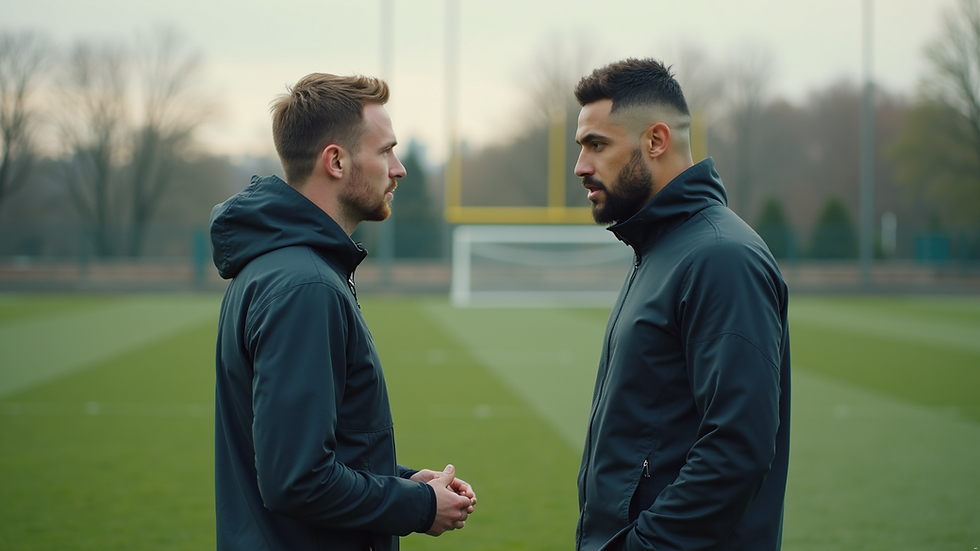Traits of the Best Performance Coaches
- mmancini116
- Sep 29, 2025
- 3 min read
Performance coaching has become a vital tool for individuals and organizations aiming to reach new heights. Whether in sports, business, or personal development, a top performance coach can make a significant difference. But what exactly sets the best apart from the rest? This article explores the essential traits that define a top performance coach and how these qualities translate into real-world success.
Understanding the Role of a Top Performance Coach
A top performance coach is more than just a motivator or advisor. They are skilled professionals who guide clients through mental game or business challenges to achieve peak performance. Their role involves identifying strengths and weaknesses, setting realistic goals, and developing personalized strategies.
For example, a coach working with an athlete might focus on mental resilience and focus during competitions, while a business executive’s coach might emphasize leadership skills and stress management. The ability to adapt coaching methods to individual needs is a hallmark of a top performance coach.

Key Characteristics of a Top Performance Coach
1. Exceptional Communication Skills
Effective communication is the foundation of any coaching relationship. A top performance coach listens actively and asks insightful questions. They provide clear, constructive feedback that encourages growth without discouragement.
For instance, instead of simply telling a client what to do, they might say, "What do you think worked well in that situation, and what could be improved?" This approach fosters self-awareness and accountability.
2. Empathy and Emotional Intelligence
Understanding a client’s emotions and perspectives is crucial. A top performance coach demonstrates empathy, creating a safe space for clients to express fears, doubts, and aspirations. This emotional connection builds trust and motivates clients to push beyond their limits.
3. Strong Analytical and Problem-Solving Abilities
Top coaches analyze performance data, behaviors, and patterns to identify obstacles. They use this information to develop tailored strategies that address specific challenges. For example, if a client struggles with time management, the coach might introduce prioritization techniques and productivity tools.
4. Commitment to Continuous Learning
The best coaches stay updated with the latest research in psychology, physiology, and coaching methodologies. They attend workshops, read extensively, and seek feedback to refine their skills. This commitment ensures they provide clients with cutting-edge techniques and insights.
5. Inspirational Leadership
A top performance coach leads by example, demonstrating discipline, passion, and resilience. Their enthusiasm inspires clients to adopt similar attitudes, fostering a culture of excellence and perseverance.
It’s important to view coaching as an investment in personal or professional growth. The right coach can deliver returns far beyond the initial cost by unlocking potential and improving performance.

Practical Tips for Choosing the Right Performance Coach
Selecting the right coach can be overwhelming. Here are some actionable recommendations to help you make an informed decision:
Define Your Goals: Be clear about what you want to achieve. Different coaches specialize in various areas such as sports, executive leadership, or mental toughness.
Check Credentials: Look for certifications, experience, and client testimonials.
Schedule a Consultation: Many coaches offer free initial sessions. Use this opportunity to assess compatibility and coaching style.
Evaluate Communication Style: Choose a coach whose communication resonates with you and encourages open dialogue.
Consider Logistics: Factor in location, availability, and cost to ensure a sustainable coaching relationship.
The Impact of a Best Performance Coach on Your Journey
Working with the best performance coach can transform your approach to challenges and success. They help you develop mental clarity, emotional balance, and physical readiness. This holistic development leads to improved confidence, decision-making, and resilience.
For example, a client might start with low motivation and scattered focus. Through coaching, they learn to set clear priorities, manage stress, and maintain consistent effort. Over time, these changes result in measurable improvements in performance and satisfaction.

Embracing Growth with the Right Support
The journey to peak performance is ongoing. A top performance coach provides the guidance, support, and accountability needed to sustain progress. By embodying the traits discussed, they empower clients to overcome obstacles and reach their full potential.
If you are ready to elevate your performance, consider partnering with a professional who exemplifies these qualities. The right coach can be the catalyst for lasting success and fulfillment.



Comments